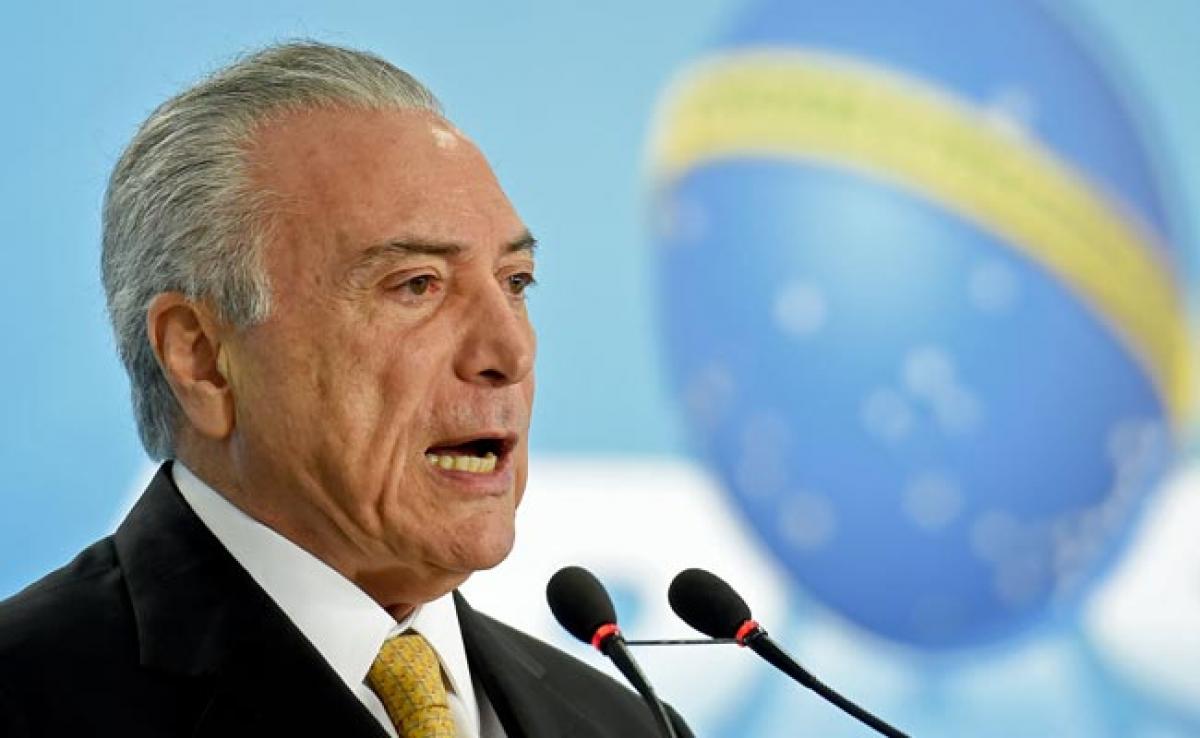Live
- SC denies pre-arrest bail to Jaynarayan
- CM waives hostel food fee
- UBI celebrates 106th foundation day
- 294-year-old Khallikote Jagannath temple crumbling
- ‘Bangaru Balotsavalu’ launched
- Army officer, fiancee appear before judicial panel
- AP govt to use geotagging to provide better, speedy services to people
- Law to curb unfair practices in recruitment exams
- Telugu People Foundation members call on Pawan Kalyan
- Surekha has big plans to develop Vemulawada temple
Just In

President Michel Temer was to hold crisis talks Sunday with his cabinet and foreign ambassadors over allegations that corrupt Brazilian producers have been selling rotten meat around the world for years.
President Michel Temer was to hold crisis talks Sunday with his cabinet and foreign ambassadors over allegations that corrupt Brazilian producers have been selling rotten meat around the world for years.
The revelation on Friday of a two-year police probe into alleged bribery of health inspectors to certify tainted food as fit for consumption has struck at the heart of the world's leading exporter of beef and chicken.
Temer, whose government is already battered by a huge embezzlement scandal and fallout from Brazil's deepest recession in history, was to huddle first with meatpacking representatives and his ministers of agriculture and foreign trade.
Next up will be ambassadors from countries that are major importers of Brazilian meat.
Brazilian multinationals caught up in the growing scandal insisted on Saturday that their products were safe, but the scandal has sparked growing public fears. It comes at a sensitive time, as Brazil and other members of South America's Mercosur group are pushing for a trade deal with the European Union, a big market for Brazilian meat.
Temer had been scheduled to speak by phone on Saturday with US President Donald Trump, though their agenda was unclear. The United States last year began accepting imports of raw beef from Brazil.
Brazilian authorities on Friday raided more than a dozen meatpacking centers, issuing 27 arrest warrants and closing a chicken-processing plant run by the multinational BRF group and two meat-processing plants operated by the local Peccin company, the Agriculture Ministry said.
An additional 21 establishments are under investigation, and the ministry dismissed 33 officials involved in the scheme.
The authorities did not say where tainted products had been found, but noted, in a news conference in the southern city of Curitiba, that carcinogenic substances had in some cases been used to mask the odor of bad meat.
Federal police were due to give details at a press conference on Monday.
In addition to the giant BRF firm, which owns the Sadia and Perdigao brands, companies under investigation include JBS, a world leader in meat sales and owner of the Big Frango, Seara Alimentos and Swift brands.
JBS took out a full-page ad in the newspaper O Globo to say that the federal office conducting the investigation had made no mention of health problems stemming from JBS products. The BRF group is running similar ads, saying its products pose no health risk "whatsoever."
Inspections called 'robust'
An ad in which American actor Robert De Niro testifies to the quality of JBS's Seara ham -- with its "authentic Italian flavor" -- has gotten heavy play on Brazilian television.
But Professor Silvia Farias, who shops in a Rio supermarket, said reports that some chicken products may be mixed with cardboard are worrying.
"We go to the supermarket, we buy meat for our family's consumption, and what do we expect? That it is in good condition," she told AFP.
"I would never imagine that the meat could be mixed with cardboard." Brazil sells meat and poultry to at least 150 countries, so the scandal is deeply concerning to national authorities.
Eumar Novacki, executive secretary of the Agriculture Ministry, acknowledged such concerns but insisted that the irregularities found so far constituted an "isolated fact" involving "the behavior of a minority."
He described Brazil's system of food inspection and certification as "robust."
Novacki also pointed out that all Brazilian exports are inspected upon arrival in other countries.

© 2024 Hyderabad Media House Limited/The Hans India. All rights reserved. Powered by hocalwire.com







